Ward A.W. The Cambridge History of British Foreign Policy. 1783-1919. Volume 3
Подождите немного. Документ загружается.

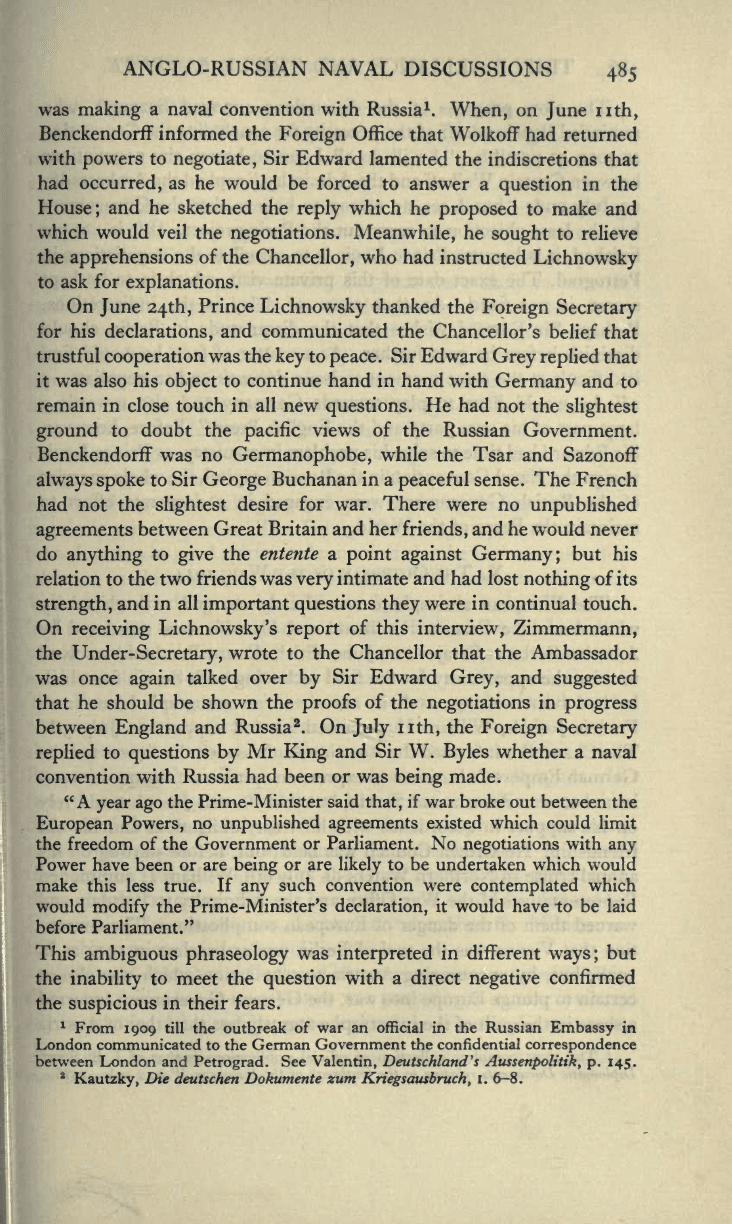
ANGLO-RUSSIAN NAVAL
DISCUSSIONS
485
was
making
a naval
convention
with Russia
1
.
When,
on
June
nth,
Benckendorff informed the
Foreign
Office
that
Wolkoff had
returned
with
powers
to
negotiate,
Sir
Edward
lamented the
indiscretions that
had
occurred,
as
he would
be forced
to
answer
a
question
in the
House;
and he
sketched the
reply
which
he
proposed
to make and
which
would
veil
the
negotiations.
Meanwhile,
he
sought
to relieve
the
apprehensions
of
the
Chancellor,
who had
instructed
Lichnowsky
to
ask for
explanations.
On
June
24th,
Prince
Lichnowsky
thanked the
Foreign
Secretary
for his
declarations,
and communicated
the
Chancellor's belief
that
trustful
cooperation
was the
key
to
peace.
Sir
Edward
Grey
replied
that
it
was
also his
object
to continue hand
in
hand
with
Germany
and
to
remain in
close touch
in all new
questions.
He
had
not the
slightest
ground
to doubt the
pacific
views of
the
Russian
Government.
Benckendorff was no
Germanophobe,
while the
Tsar
and
Sazonoff
always spoke
to
Sir
George
Buchanan in a
peaceful
sense.
The
French
had
not the
slightest
desire
for war.
There were no
unpublished
agreements
between
Great Britain
and her
friends,
and
he would
never
do
anything
to
give
the
entente a
point
against
Germany;
but his
relation to the two
friends was
very
intimate
and
had lost
nothing
of
its
strength,
and in all
important
questions
they
were
in
continual
touch.
On
receiving
Lichnowsky
's
report
of
this
interview, Zimmermann,
the
Under-Secretary,
wrote
to the Chancellor that
the Ambassador
was once
again
talked
over
by
Sir
Edward
Grey,
and
suggested
that
he should
be shown the
proofs
of
the
negotiations
in
progress
between
England
and
Russia
2
. On
July
nth,
the
Foreign
Secretary
replied
to
questions
by
Mr
King
and Sir
W.
Byles
whether
a
naval
convention with
Russia
had been
or
was
being
made.
"A
year ago
the
Prime-Minister
said
that,
if war
broke out
between the
European
Powers,
no
unpublished agreements
existed which
could limit
the
freedom
of
the
Government
or
Parliament.
No
negotiations
with
any
*ower have been
or are
being
or
are
likely
to be
undertaken
which
would
lake this less
true.
If
any
such convention
were
contemplated
which
rould
modify
the
Prime-Minister's
declaration,
it
would have
to be laid
jfore
Parliament."
'his
ambiguous phraseology
was
interpreted
in
different
ways;
but
le
inability
to
meet
the
question
with a
direct
negative
confirmed
le
suspicious
in
their
fears.
1
From
1909
till
the
outbreak
of
war an official
in
the Russian
Embassy
in
London communicated to the German
Government the confidential
correspondence
between London and
Petrograd.
See
Valentin,
Deutschland's
Aussenpolitik,
p. 145.
2
Kautzky,
Die deutschen
Dokumente
zum
Krtegsausbruch,
1. 6-8.
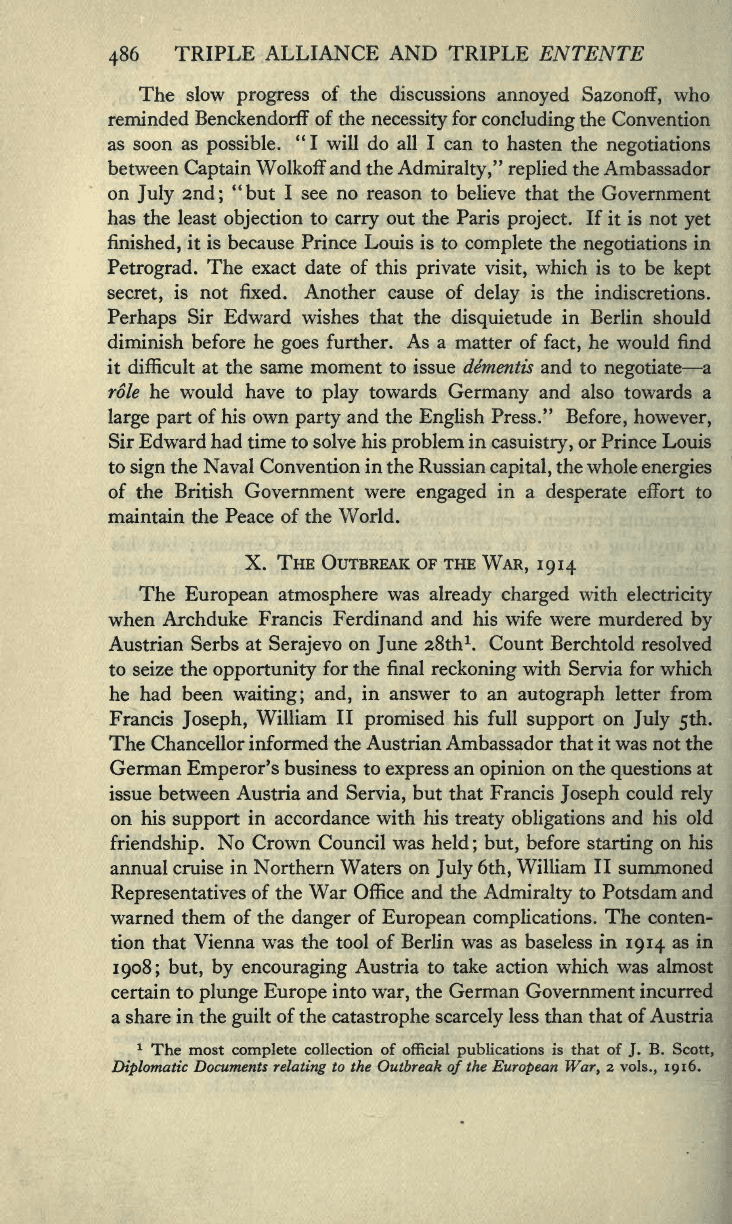
486
TRIPLE
ALLIANCE
AND
TRIPLE ENTENTE
The
slow
progress
of
the discussions
annoyed
Sazonoff,
who
reminded
Benckendorff of
the
necessity
for
concluding
the Convention
as soon
as
possible.
"I
will do all
I
can
to
hasten
the
negotiations
between
Captain
Wolkoffand
the
Admiralty," replied
the
Ambassador
on
July
2nd;
"but
I
see no reason
to
believe
that the Government
has
the least
objection
to
carry
out the
Paris
project.
If
it
is
not
yet
finished,
it
is because Prince Louis
is
to
complete
the
negotiations
in
Petrograd.
The
exact date
of
this
private
visit,
which is
to
be
kept
secret,
is
not
fixed.
Another
cause of
delay
is
the indiscretions.
Perhaps
Sir Edward wishes
that
the
disquietude
in
Berlin
should
diminish before he
goes
further.
As a
matter
of
fact,
he would find
it
difficult at the
same
moment to
issue dementis and
to
negotiate
—
a
role
he would have
to
play
towards
Germany
and also
towards
a
large
part
of his own
party
and the
English
Press."
Before,
however,
Sir
Edward had
time
to solve
his
problem
in
casuistry,
or
Prince
Louis
to
sign
the
Naval Convention in
the
Russian
capital,
the whole
energies
of
the
British Government were
engaged
in
a
desperate
effort to
maintain the
Peace
of
the
World.
X.
The Outbreak
of the
War,
19 14
The
European
atmosphere
was
already charged
with
electricity
when
Archduke
Francis
Ferdinand
and his
wife
were murdered
by
Austrian
Serbs
at
Serajevo
on
June
28th
1
. Count
Berchtold
resolved
to seize the
opportunity
for
the
final
reckoning
with
Servia for which
he
had been
waiting;
and,
in
answer
to
an
autograph
letter
from
Francis
Joseph,
William
II
promised
his full
support
on
July 5th.
The Chancellor
informed the Austrian
Ambassador
that it
was
not the
German
Emperor's
business to
express
an
opinion
on
the
questions
at
issue between
Austria
and
Servia,
but that
Francis
Joseph
could
rely
on
his
support
in
accordance with
his
treaty
obligations
and
his
old
friendship.
No Crown
Council was held
;
but,
before
starting
on
his
annual
cruise
in
Northern
Waters
on
July
6th,
William
II
summoned
Representatives
of
the
War Office
and
the
Admiralty
to Potsdam
and
warned
them
of
the
danger
of
European
complications.
The conten-
tion
that
Vienna was
the tool
of Berlin
was as
baseless
in
19 14
as
in
1908;
but,
by
encouraging
Austria to
take action which was
almost
certain to
plunge
Europe
into
war,
the
German Government
incurred
a share
in
the
guilt
of
the
catastrophe scarcely
less
than that
of
Austria
1
The
most
complete
collection of official
publications
is
that
of
J.
B.
Scott,
Diplomatic
Documents
relating
to the Outbreak
of
the
European
War,
2
vols.,
19
16.
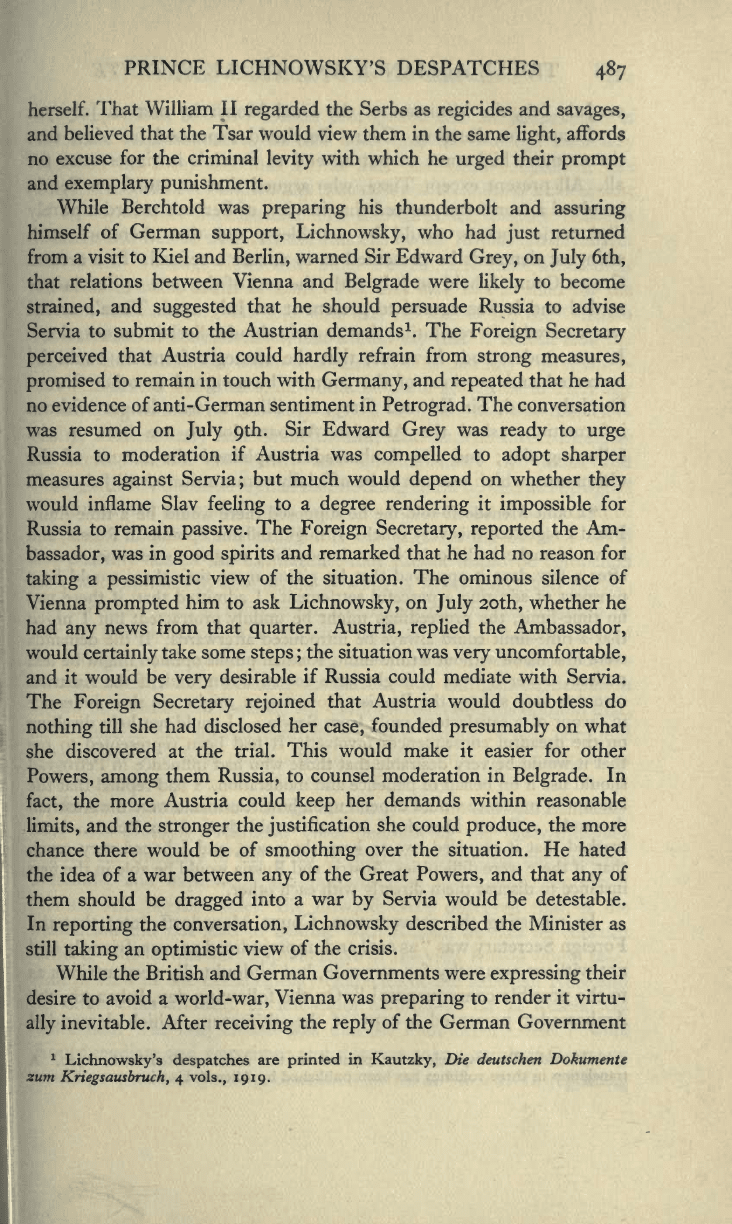
PRINCE
LICHNOWSKY'S
DESPATCHES
487
herself.
That
William II
regarded
the
Serbs
as
regicides
and
savages,
and
believed
that the
Tsar
would
view
them
in
the
same
light,
affords
no
excuse
for
the criminal
levity
with
which
he
urged
their
prompt
and
exemplary
punishment.
While Berchtold
was
preparing
his
thunderbolt
and
assuring
himself
of German
support,
Lichnowsky,
who
had
just
returned
from
a visit to
Kiel
and
Berlin,
warned Sir
Edward
Grey,
on
July
6th,
that
relations between Vienna
and
Belgrade
were
likely
to
become
strained,
and
suggested
that
he should
persuade
Russia
to
advise
Servia to submit
to the Austrian demands
1
.
The
Foreign
Secretary
perceived
that
Austria
could
hardly
refrain
from
strong
measures,
promised
to
remain
in
touch with
Germany,
and
repeated
that
he had
no evidence of anti-German sentiment
in
Petrograd.
The
conversation
was resumed
on
July 9th.
Sir Edward
Grey
was
ready
to
urge
Russia
to
moderation
if
Austria
was
compelled
to
adopt sharper
measures
against
Servia;
but much
would
depend
on
whether
they
would
inflame Slav
feeling
to
a
degree rendering
it
impossible
for
Russia to remain
passive.
The
Foreign Secretary,
reported
the Am-
bassador,
was
in
good
spirits
and remarked
that he
had no
reason
for
taking
a
pessimistic
view
of
the
situation. The ominous
silence
of
Vienna
prompted
him
to
ask
Lichnowsky,
on
July
20th,
whether he
had
any
news
from that
quarter.
Austria,
replied
the
Ambassador,
would
certainly
take
some
steps
;
the situation was
very
uncomfortable,
and
it
would
be
very
desirable
if
Russia
could
mediate
with
Servia.
The
Foreign
Secretary
rejoined
that Austria
would
doubtless
do
nothing
till
she
had disclosed
her
case,
founded
presumably
on
what
she
discovered at the trial.
This would make
it easier
for
other
Powers,
among
them
Russia,
to
counsel
moderation
in
Belgrade.
In
fact,
the
more Austria
could
keep
her demands within
reasonable
limits,
and the
stronger
the
justification
she
could
produce,
the
more
chance
there
would be
of
smoothing
over
the situation. He hated
the idea
of a war
between
any
of
the Great
Powers,
and that
any
of
them should
be
dragged
into
a
war
by
Servia would
be detestable.
In
reporting
the
conversation,
Lichnowsky
described the
Minister as
still
taking
an
optimistic
view
of the
crisis.
While the British
and
German
Governments were
expressing
their
desire
to
avoid a
world-war,
Vienna
was
preparing
to
render it virtu-
ally
inevitable. After
receiving
the
reply
of
the German Government
1
Lichnowsky's despatches
are
printed
in
Kautzky,
Die deutschen Dokumente
zum
Kriegsawbruch, 4
vols., 1919.
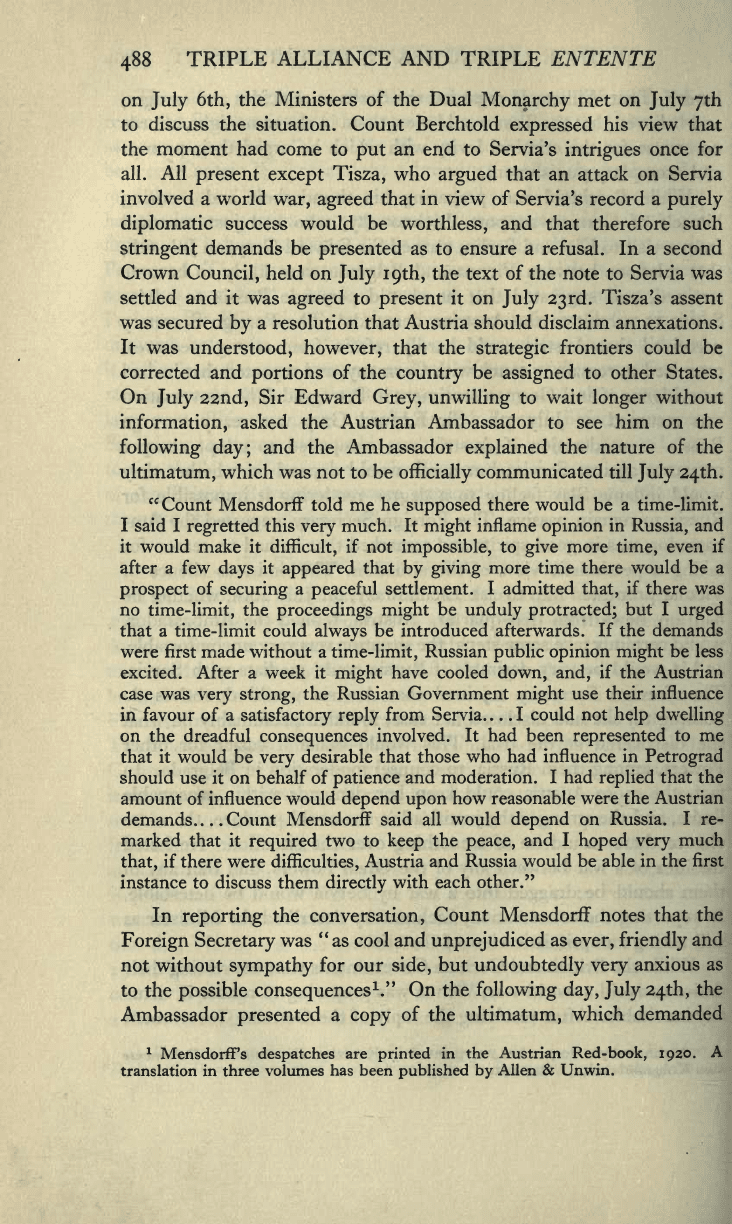
488
TRIPLE
ALLIANCE AND
TRIPLE
ENTENTE
on
July
6th,
the Ministers
of
the Dual
Monarchy
met
on
July
7th
to
discuss
the situation. Count
Berchtold
expressed
his view
that
the moment
had
come to
put
an
end
to
Servia's
intrigues
once
for
all.
All
present
except
Tisza,
who
argued
that
an
attack
on Servia
involved a world
war,
agreed
that
in
view of
Servia's record
a
purely
diplomatic
success would be
worthless,
and
that therefore
such
stringent
demands
be
presented
as
to ensure
a
refusal.
In a
second
Crown
Council,
held on
July
19th,
the text
of
the
note
to Servia
was
settled
and
it
was
agreed
to
present
it on
July 23
rd. Tisza's assent
was
secured
by
a
resolution that Austria
should disclaim
annexations.
It
was
understood, however,
that the
strategic
frontiers
could be
corrected and
portions
of the
country
be
assigned
to other States.
On
July
22nd,
Sir Edward
Grey, unwilling
to wait
longer
without
information,
asked
the
Austrian
Ambassador
to see
him on
the
following
day;
and the
Ambassador
explained
the
nature
of
the
ultimatum,
which was
not
to be
officially
communicated
till
July 24th.
"Count Mensdorff told me he
supposed
there would be
a
time-limit.
I
said I
regretted
this
very
much.
It
might
inflame
opinion
in
Russia,
and
it would
make it
difficult,
if not
impossible,
to
give
more
time,
even
if
after
a
few
days
it
appeared
that
by giving
more time there
would be a
prospect
of
securing
a
peaceful
settlement.
I
admitted
that,
if there was
no
time-limit,
the
proceedings
might
be
unduly protracted;
but I
urged
that
a
time-limit
could
always
be introduced afterwards.
If the demands
were first made without a
time-limit,
Russian
public opinion might
be less
excited. After
a week it
might
have
cooled
down, and,
if
the Austrian
case
was
very
strong,
the Russian Government
might
use their influence
in
favour of
a
satisfactory reply
from Servia I could not
help dwelling
on
the dreadful
consequences
involved.
It had been
represented
to
me
that it would be
very
desirable that
those
who
had influence
in
Petrograd
should use it on behalf of
patience
and
moderation.
I had
replied
that the
amount
of
influence would
depend
upon
how
reasonable
were the
Austrian
demands Count Mensdorff
said
all would
depend
on
Russia.
I
re-
marked that it
required
two to
keep
the
peace,
and I
hoped very
much
that,
if
there
were
difficulties,
Austria
and Russia
would be able
in
the
first
instance to discuss
them
directly
with each other."
In
reporting
the
conversation,
Count Mensdorff notes that
the
Foreign Secretary
was
"
as
cool and
unprejudiced
as
ever,
friendly
and
not without
sympathy
for
our
side,
but
undoubtedly
very
anxious
as
to the
possible
consequences
1
."
On
the
following
day, July 24th,
the
Ambassador
presented
a
copy
of
the
ultimatum,
which demanded
1
Mensdorff's
despatches
are
printed
in the Austrian
Red-book,
1920.
A
translation in three
volumes
has been
published
by
Allen & Unwin.
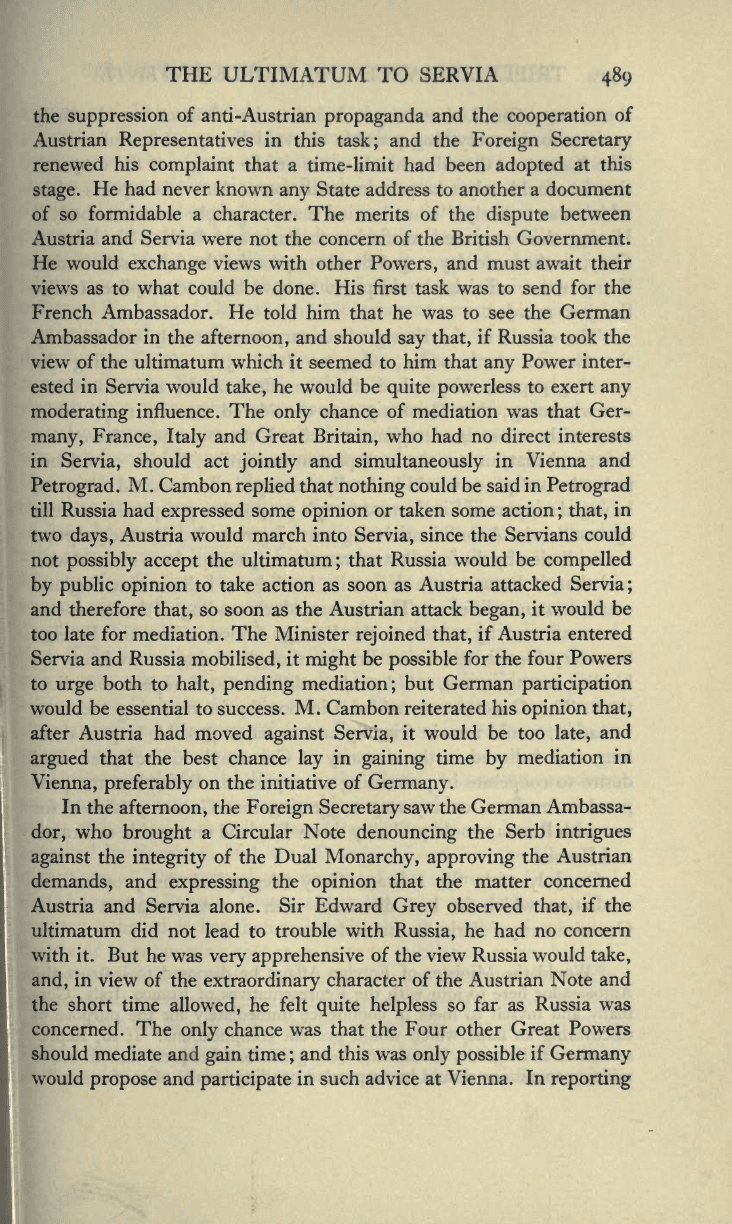
THE
ULTIMATUM TO
SERVIA
489
the
suppression
of
anti-Austrian
propaganda
and the
cooperation
of
Austrian
Representatives
in
this
task;
and
the
Foreign
Secretary
renewed
his
complaint
that
a
time-limit
had been
adopted
at this
stage.
He
had
never known
any
State
address
to another
a document
of
so
formidable
a
character. The
merits
of
the
dispute
between
Austria
and
Servia
were
not the
concern of
the British
Government.
He
would
exchange
views
with other
Powers,
and must await their
views as to what could
be done.
His
first task
was
to
send
for
the
French Ambassador. He
told
him
that
he was to see the
German
Ambassador in
the
afternoon,
and should
say
that,
if
Russia took the
view of
the
ultimatum
which
it
seemed
to
him
that
any
Power inter-
ested
in
Servia
would
take,
he would
be
quite
powerless
to
exert
any
moderating
influence. The
only
chance
of
mediation
was that
Ger-
many,
France,
Italy
and
Great
Britain,
who had no direct interests
in
Servia,
should
act
jointly
and
simultaneously
in Vienna
and
Petrograd.
M. Cambon
replied
that
nothing
could be
said in
Petrograd
till
Russia had
expressed
some
opinion
or
taken
some action
; that,
in
two
days,
Austria
would march
into
Servia,
since
the
Servians
could
not
possibly accept
the
ultimatum;
that
Russia would
be
compelled
by
public
opinion
to take
action
as soon as
Austria
attacked
Servia;
and
therefore
that,
so soon
as the Austrian attack
began,
it
would
be
too late
for
mediation.
The
Minister
rejoined
that,
if Austria
entered
Servia and
Russia
mobilised,
it
might
be
possible
for
the
four
Powers
to
urge
both to
halt,
pending
mediation;
but
German
participation
would be
essential to
success.
M.
Cambon reiterated
his
opinion
that,
after
Austria
had
moved
against
Servia,
it
would be
too
late,
and
argued
that the best
chance
lay
in
gaining
time
by
mediation
in
Vienna,
preferably
on
the
initiative
of
Germany.
In
the
afternoon,
the
Foreign Secretary
saw the German
Ambassa-
dor,
who
brought
a Circular Note
denouncing
the
Serb
intrigues
against
the
integrity
of the
Dual
Monarchy,
approving
the
Austrian
demands,
and
expressing
the
opinion
that
the matter
concerned
Austria and
Servia alone.
Sir Edward
Grey
observed
that,
if
the
ultimatum did
not lead to
trouble
with
Russia,
he
had
no concern
with it.
But
he
was
very
apprehensive
of
the view Russia
would
take,
and,
in
view
of
the
extraordinary
character of
the Austrian
Note
and
the
short time
allowed,
he
felt
quite
helpless
so
far as
Russia
was
concerned.
The
only
chance
was that the
Four
other
Great
Powers
should
mediate and
gain
time
;
and this was
only possible
if
Germany
would
propose
and
participate
in such
advice at Vienna.
In
reporting
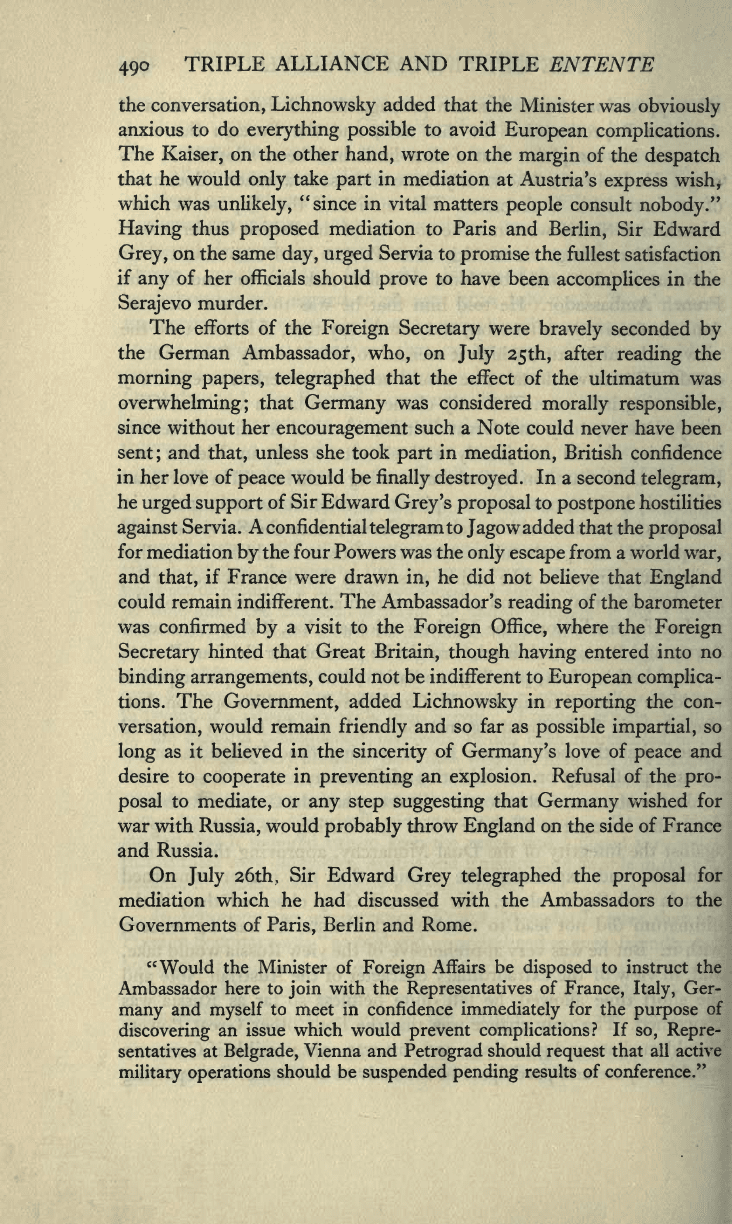
490
TRIPLE
ALLIANCE
AND
TRIPLE
ENTENTE
the
conversation,
Lichnowsky
added
that
the
Minister was
obviously
anxious to
do
everything
possible
to avoid
European
complications.
The
Kaiser,
on
the
other
hand,
wrote
on
the
margin
of
the
despatch
that he would
only
take
part
in
mediation
at
Austria's
express
wish,
which
was
unlikely,
"since
in
vital
matters
people
consult
nobody."
Having
thus
proposed
mediation
to Paris and
Berlin,
Sir Edward
Grey,
on
the same
day, urged
Servia
to
promise
the
fullest satisfaction
if
any
of
her officials should
prove
to have
been
accomplices
in
the
Serajevo
murder.
The
efforts
of
the
Foreign
Secretary
were
bravely
seconded
by
the German
Ambassador,
who,
on
July
25th,
after
reading
the
morning
papers,
telegraphed
that
the
effect
of
the ultimatum was
overwhelming;
that
Germany
was
considered
morally
responsible,
since
without her
encouragement
such a
Note could
never have been
sent
;
and
that,
unless
she
took
part
in
mediation,
British confidence
in
her
love
of
peace
would
be
finally destroyed.
In
a second
telegram,
he
urged support
of
Sir
Edward
Grey's proposal
to
postpone
hostilities
against
Servia.
A
confidential
telegram
to
Jagowadded
that
the
proposal
for
mediation
by
the
four
Powers
was the
only escape
from a world
war,
and
that,
if
France were
drawn
in,
he
did
not believe that
England
could
remain
indifferent.
The Ambassador's
reading
of the barometer
was
confirmed
by
a
visit to
the
Foreign
Office,
where the
Foreign
Secretary
hinted that Great
Britain,
though
having
entered into
no
binding
arrangements,
could
not be
indifferent
to
European complica-
tions. The
Government,
added
Lichnowsky
in
reporting
the
con-
versation,
would remain
friendly
and so far
as
possible
impartial,
so
long
as
it believed
in
the
sincerity
of
Germany's
love
of
peace
and
desire to
cooperate
in
preventing
an
explosion.
Refusal
of
the
pro-
posal
to
mediate,
or
any step suggesting
that
Germany
wished
for
war
with
Russia,
would
probably
throw
England
on
the
side
of France
and Russia.
On
July
26th,
Sir
Edward
Grey telegraphed
the
proposal
for
mediation
which he
had
discussed with
the Ambassadors to the
Governments
of
Paris,
Berlin and Rome.
"Would
the
Minister of
Foreign
Affairs be
disposed
to instruct
the
Ambassador
here
to
join
with the
Representatives
of
France,
Italy,
Ger-
many
and
myself
to
meet
in
confidence
immediately
for
the
purpose
of
discovering
an issue which would
prevent complications?
If
so,
Repre-
sentatives
at
Belgrade,
Vienna and
Petrograd
should
request
that
all active
military operations
should be
suspended pending
results
of conference."
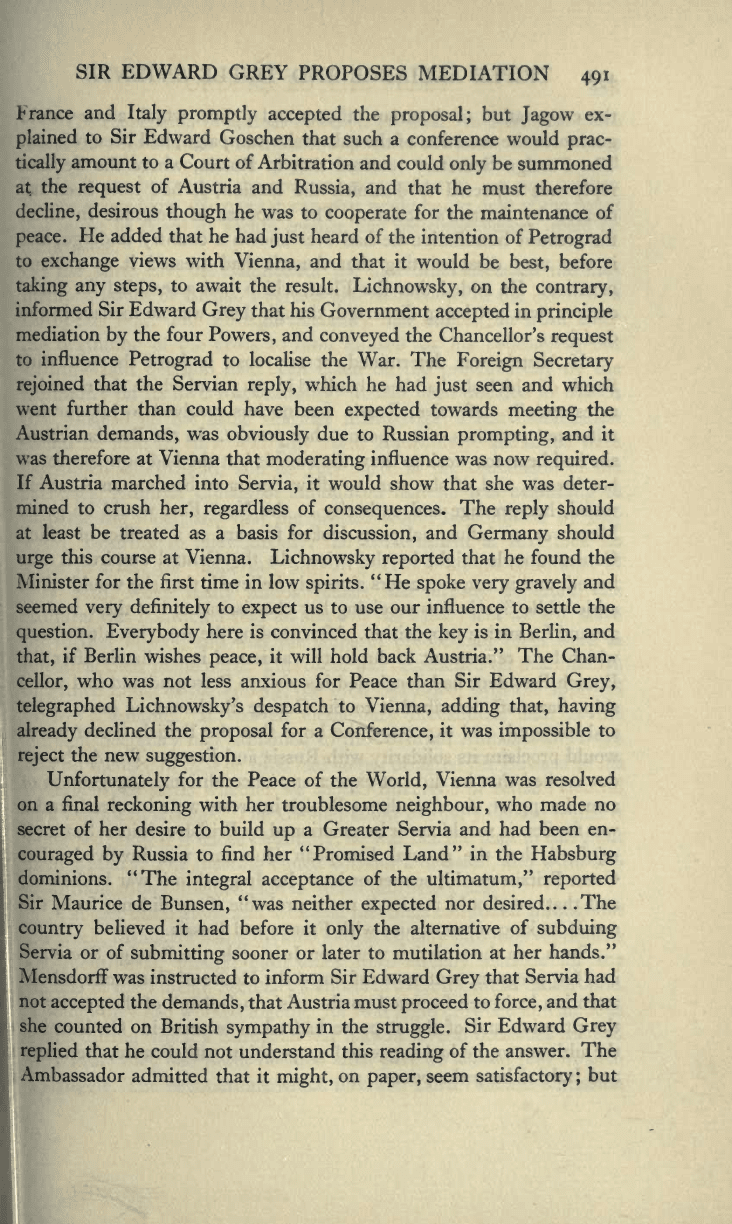
SIR
EDWARD
GREY
PROPOSES
MEDIATION
491
trance
and
Italy
promptly
accepted
the
proposal;
but
Jagow
ex-
plained
to
Sir
Edward
Goschen
that
such
a
conference
would
prac-
tically
amount
to
a
Court
of
Arbitration
and could
only
be
summoned
at
the
request
of
Austria and
Russia,
and
that he
must therefore
decline,
desirous
though
he was
to
cooperate
for
the
maintenance
of
peace.
He added
that he had
just
heard of
the intention of
Petrograd
to
exchange
views
with
Vienna,
and
that it would
be
best,
before
taking
any steps,
to
await the result.
Lichnowsky,
on
the
contrary,
informed Sir
Edward
Grey
that his
Government
accepted
in
principle
mediation
by
the
four
Powers,
and
conveyed
the Chancellor's
request
to
influence
Petrograd
to localise
the War. The
Foreign Secretary
rejoined
that the Servian
reply,
which he had
just
seen and which
went further
than
could
have been
expected
towards
meeting
the
Austrian
demands,
was
obviously
due to Russian
prompting,
and
it
was
therefore
at Vienna that
moderating
influence was now
required.
If Austria
marched
into
Servia,
it
would show
that she was
deter-
mined
to
crush
her,
regardless
of
consequences.
The
reply
should
at least be treated as
a basis for
discussion,
and
Germany
should
urge
this course
at Vienna.
Lichnowsky
reported
that
he found the
Minister
for
the
first time
in
low
spirits.
"He
spoke very gravely
and
seemed
very
definitely
to
expect
us
to
use our influence to settle
the
question.
Everybody
here
is
convinced that the
key
is
in
Berlin,
and
that,
if Berlin
wishes
peace,
it
will hold back
Austria."
The
Chan-
cellor,
who
was not less anxious for
Peace than
Sir
Edward
Grey,
telegraphed Lichnowsky's despatch
to
Vienna,
adding
that,
having
already
declined
the
proposal
for a
Conference,
it
was
impossible
to
reject
the
new
suggestion.
Unfortunately
for
the Peace
of
the
World,
Vienna
was
resolved
on a final
reckoning
with her troublesome
neighbour,
who made
no
secret
of
her desire
to
build
up
a
Greater
Servia
and had been
en-
couraged
by
Russia
to
find her "Promised Land"
in
the
Habsburg
dominions.
"The
integral
acceptance
of
the
ultimatum,"
reported
Sir
Maurice
de
Bunsen,
"was neither
expected
nor
desired..
.
.The
country
believed
it had before it
only
the
alternative
of
subduing
Servia or
of
submitting
sooner
or later to mutilation at
her hands."
Mensdorff
was
instructed to
inform
Sir Edward
Grey
that
Servia
had
not
accepted
the
demands,
that
Austria
must
proceed
to
force,
and that
she
counted on
British
sympathy
in
the
struggle.
Sir
Edward
Grey
replied
that he could
not
understand this
reading
of the
answer. The
Ambassador
admitted that
it
might,
on
paper,
seem
satisfactory;
but
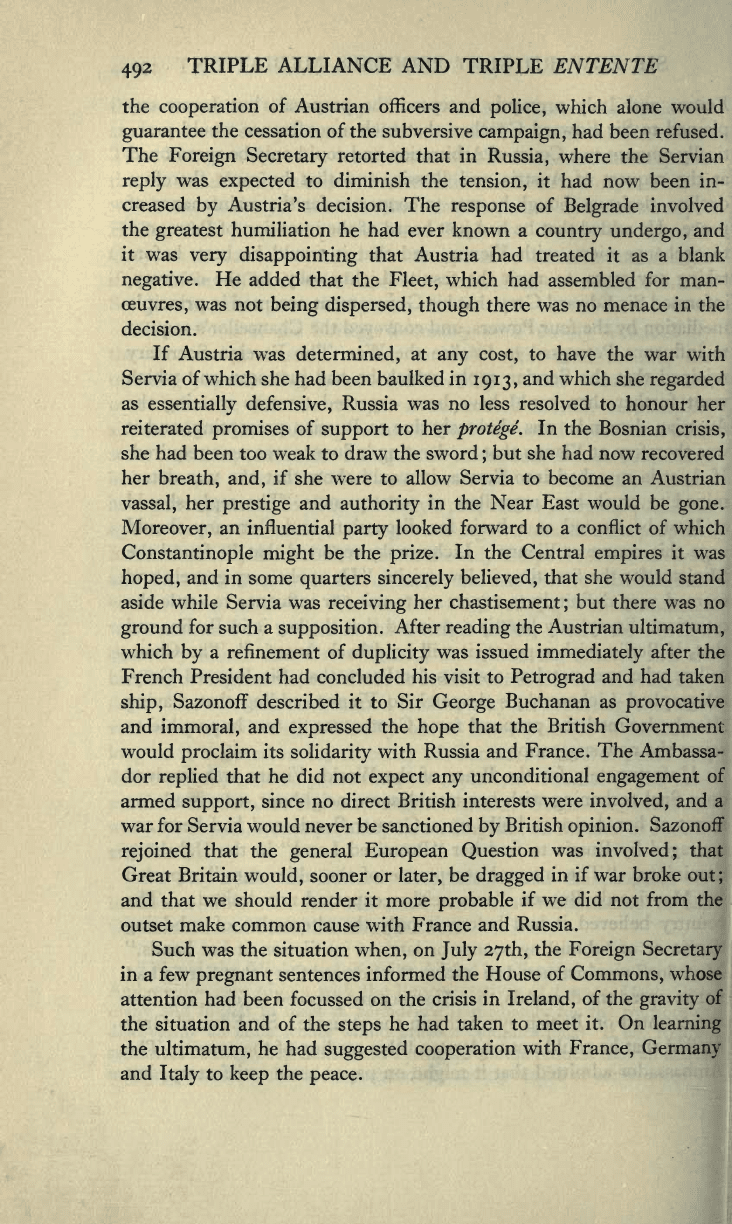
492
TRIPLE
ALLIANCE AND
TRIPLE ENTENTE
the
cooperation
of
Austrian officers
and
police,
which alone
would
guarantee
the cessation
of
the subversive
campaign,
had
been refused.
The
Foreign
Secretary
retorted that
in
Russia,
where
the
Servian
reply
was
expected
to
diminish
the
tension,
it
had now been
in-
creased
by
Austria's
decision. The
response
of
Belgrade
involved
the
greatest
humiliation he
had
ever known a
country
undergo,
and
it was
very
disappointing
that Austria
had
treated it
as
a blank
negative.
He
added
that the
Fleet,
which had
assembled
for man-
oeuvres,
was
not
being
dispersed,
though
there
was
no
menace in the
decision.
If
Austria was
determined,
at
any
cost,
to
have
the
war
with
Servia of
which she had been baulked
in
1913,
and which
she
regarded
as
essentially
defensive,
Russia
was no
less resolved
to honour
her
reiterated
promises
of
support
to
her
protege.
In
the Bosnian
crisis,
she had
been too weak
to
draw the
sword
;
but
she had
now
recovered
her
breath, and,
if
she were
to
allow Servia to become an
Austrian
vassal,
her
prestige
and
authority
in
the
Near
East
would
be
gone.
Moreover,
an
influential
party
looked
forward
to
a
conflict of which
Constantinople
might
be the
prize.
In
the Central
empires
it was
hoped,
and in
some
quarters sincerely
believed,
that she would
stand
aside while Servia was
receiving
her
chastisement;
but there
was no
ground
for such a
supposition.
After
reading
the Austrian
ultimatum,
which
by
a
refinement of
duplicity
was
issued
immediately
after the
French
President
had concluded
his
visit
to
Petrograd
and had
taken
ship,
Sazonoff
described it to
Sir
George
Buchanan as
provocative
and
immoral,
and
expressed
the
hope
that the British Government
would
proclaim
its
solidarity
with
Russia
and France.
The
Ambassa-
dor
replied
that
he did
not
expect
any
unconditional
engagement
of
armed
support,
since
no
direct
British interests
were
involved,
and a
war for Servia would
never be sanctioned
by
British
opinion.
Sazonoff
rejoined
that the
general
European
Question
was
involved;
that
Great Britain
would,
sooner
or
later,
be
dragged
in if war broke
out;
and
that we should render
it
more
probable
if
we did
not
from
the
outset
make
common cause with
France
and Russia.
Such
was the
situation
when,
on
July
27th,
the
Foreign
Secretary
in
a few
pregnant
sentences
informed
the
House
of
Commons,
whose
attention had been
focussed
on
the
crisis
in
Ireland,
of
the
gravity
of
the situation and
of
the
steps
he
had taken
to meet it.
On
learning
the
ultimatum,
he
had
suggested
cooperation
with
France,
Germany
and
Italy
to
keep
the
peace.
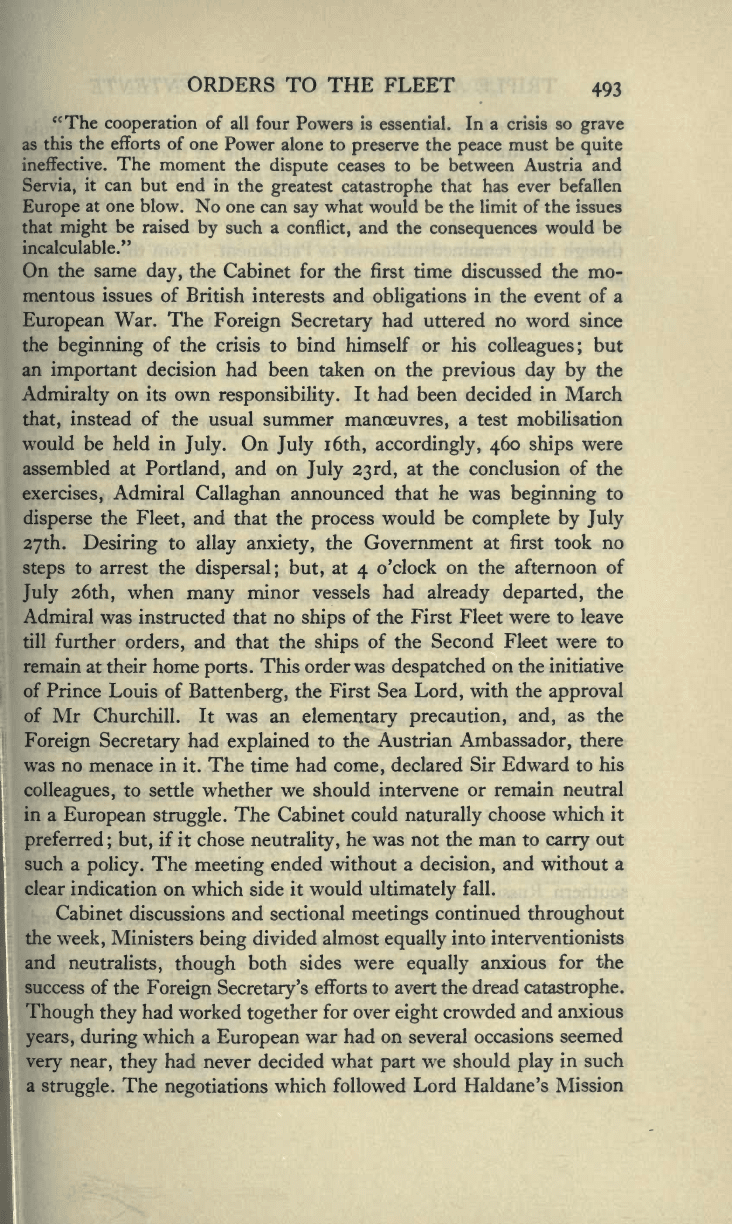
ORDERS
TO
THE FLEET
493
"The
cooperation
of
all
four Powers is
essential.
In a crisis so
grave
as
this
the efforts of
one
Power
alone
to
preserve
the
peace
must be
quite
ineffective.
The
moment
the
dispute
ceases to
be
between Austria
and
Servia,
it can
but
end in
the
greatest catastrophe
that has ever befallen
Europe
at
one
blow. No
one
can
say
what would be
the
limit of the
issues
that
might
be
raised
by
such
a
conflict,
and
the
consequences
would be
incalculable."
On
the same
day,
the
Cabinet
for
the first time discussed
the mo-
mentous issues of
British
interests
and
obligations
in
the event
of
a
European
War.
The
Foreign Secretary
had
uttered
no word
since
the
beginning
of
the crisis
to
bind
himself
or
his
colleagues;
but
an
important
decision had
been
taken
on
the
previous day by
the
Admiralty
on
its
own
responsibility.
It
had
been decided
in
March
that,
instead
of
the
usual
summer
manoeuvres,
a
test mobilisation
would
be held
in
July.
On
July
16th,
accordingly, 460
ships
were
assembled
at
Portland,
and on
July
23rd,
at
the
conclusion of
the
exercises,
Admiral
Callaghan
announced
that
he was
beginning
to
disperse
the
Fleet,
and
that the
process
would
be
complete
by July
27th.
Desiring
to
allay anxiety,
the
Government at
first
took
no
steps
to
arrest the
dispersal;
but,
at
4
o'clock on the afternoon of
July
26th,
when
many
minor
vessels had
already departed,
the
Admiral
was
instructed that
no
ships
of
the First
Fleet were to leave
till
further
orders,
and
that
the
ships
of
the
Second Fleet
were
to
remain
at their home
ports.
This order was
despatched
on
the
initiative
of
Prince Louis of
Battenberg,
the First
Sea
Lord,
with
the
approval
of
Mr
Churchill.
It
was an
elementary
precaution,
and,
as
the
Foreign
Secretary
had
explained
to
the
Austrian
Ambassador,
there
was no
menace in
it.
The
time
had
come,
declared
Sir Edward to
his
colleagues,
to settle
whether
we should intervene
or
remain neutral
in
a
European
struggle.
The Cabinet
could
naturally
choose
which
it
preferred
; but,
if
it
chose
neutrality,
he was
not the
man
to
carry
out
such
a
policy.
The
meeting
ended without
a
decision,
and
without
a
clear
indication on which side it
would
ultimately
fall.
Cabinet discussions and sectional
meetings
continued
throughout
the
week,
Ministers
being
divided almost
equally
into
interventionists
and
neutralists,
though
both
sides were
equally
anxious
for the
success of
the
Foreign
Secretary's
efforts
to
avert
the
dread
catastrophe.
Though
they
had
worked
together
for over
eight
crowded
and
anxious
years,
during
which a
European
war had
on
several
occasions
seemed
very
near,
they
had
never
decided what
part
we should
play
in such
a
struggle.
The
negotiations
which followed
Lord Haldane's Mission
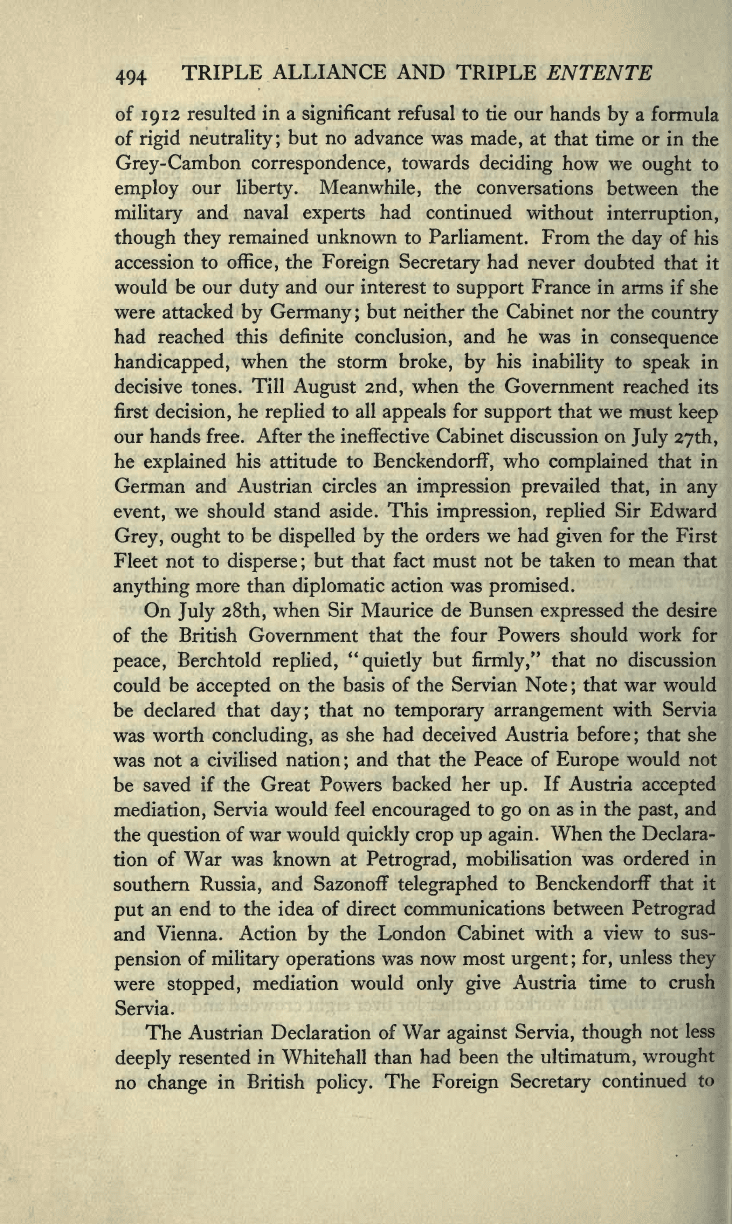
494
TRIPLE
ALLIANCE AND
TRIPLE
ENTENTE
of
191
2
resulted
in
a
significant
refusal
to tie our
hands
by
a
formula
of
rigid
neutrality;
but
no
advance was
made,
at
that time or in
the
Grey-Cambon
correspondence,
towards
deciding
how
we
ought
to
employ
our
liberty.
Meanwhile,
the
conversations
between
the
military
and naval
experts
had
continued
without
interruption,
though they
remained
unknown
to
Parliament. From
the
day
of
his
accession to
office,
the
Foreign
Secretary
had
never
doubted
that it
would be our
duty
and our
interest to
support
France in
arms if
she
were
attacked
by Germany
;
but neither the
Cabinet
nor
the
country
had
reached
this
definite
conclusion,
and he was in
consequence
handicapped,
when
the storm
broke,
by
his
inability
to
speak
in
decisive tones.
Till
August
2nd,
when the
Government reached
its
first
decision,
he
replied
to
all
appeals
for
support
that
we
must
keep
our hands free.
After the ineffective Cabinet discussion
on
July
27th,
he
explained
his
attitude to
Benckendorff,
who
complained
that
in
German and Austrian
circles
an
impression prevailed
that,
in
any
event,
we should stand aside.
This
impression, replied
Sir
Edward
Grey, ought
to
be
dispelled
by
the
orders we had
given
for
the
First
Fleet not to
disperse;
but that fact must
not be taken
to
mean
that
anything
more
than
diplomatic
action was
promised.
On
July
28th,
when
Sir
Maurice
de Bunsen
expressed
the
desire
of
the British
Government that the
four Powers should
work
for
peace,
Berchtold
replied,
"quietly
but
firmly,"
that
no discussion
could
be
accepted
on
the
basis of
the
Servian Note
;
that war would
be
declared that
day;
that
no
temporary arrangement
with
Servia
was worth
concluding,
as she had deceived Austria
before;
that
she
was not a
civilised nation
;
and
that the
Peace
of
Europe
would
not
be
saved
if
the
Great
Powers backed her
up.
If Austria
accepted
mediation,
Servia would feel
encouraged
to
go
on as
in
the
past,
and
the
question
of
war
would
quickly
crop up again.
When the
Declara-
tion
of War
was known
at
Petrograd,
mobilisation was
ordered in
southern
Russia,
and
Sazonoff
telegraphed
to
Benckendorff that
it
put
an end to the idea of direct
communications between
Petrograd
and
Vienna. Action
by
the
London
Cabinet
with
a
view
to sus-
pension
of
military
operations
was
now most
urgent
; for,
unless
they
were
stopped,
mediation
would
only give
Austria time
to
crush
Servia.
The
Austrian
Declaration
of War
against
Servia,
though
not
less
deeply
resented
in
Whitehall than
had been the
ultimatum,
wrought
no
change
in British
policy.
The
Foreign
Secretary
continued
to
